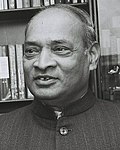| No. | Portrait | Minister
(birth-death)
Constituency | Term of office | Political party | Ministry | Prime Minister |
|---|
| From | To | Period |
|---|
| 1 | | | Rustom Khurshedji Sidhwa
(1882–1957) | 11 October
1951 | 13 May
1952 | 215 days | Indian National Congress | Nehru I | | Jawaharlal Nehru |
|---|
| 2 | |  | B. N. Datar
(1894–1963)
MP for Belgaum | 14 February
1956 | 17 April
1957 | 6 years, 364 days | Nehru II |
|---|
17 April
1957 | 10 April
1962 | Nehru III |
16 April
1962 | 13 February
1963 | Nehru IV |
| 3 | |  | Ramchandra Martand Hajarnavis
(1908–1976)
MP for Bhandara | 22 February
1963 | 10 March
1964 | 1 year, 17 days |
|---|
| 4 | | 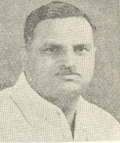 | Jaisukhlal Hathi
(1909–1982)
MP for Gujarat (Rajya Sabha) | 10 March
1964 | 27 May
1964 | 2 years, 248 days |
|---|
27 May
1964 | 9 June
1964 | Nanda I | | Gulzarilal Nanda |
9 June
1964 | 11 January
1966 | Shastri | | Lal Bahadur Shastri |
11 January
1966 | 24 January
1966 | Nanda II | | Gulzarilal Nanda |
24 January
1966 | 13 November
1966 | Indira I | | Indira Gandhi |
| 5 | |  | Vidya Charan Shukla
(1929–2013)
MP for Mahasamund | 13 March
1967 | 27 June
1970 | 3 years, 106 days |
|---|
| 6 | |  | Ram Niwas Mirdha
(1924–2010)
MP for Rajasthan (Rajya Sabha)
(Personnel and Administrative Reforms) | 27 June
1970 | 18 March
1971 | 264 days | Indian National Congress (R) | |
|---|
| 7 | |  | K. C. Pant
(1931–2012)
MP for Nainital | 27 June
1970 | 18 March
1971 | 3 years, 135 days |
|---|
18 March
1971 | 9 November
1973 | Indira II |
| 8 | |  | Om Mehta
(1927–1995)
MP for Jammu and Kashmir
(Personnel and Administrative Reforms) | 10 October
1974 | 24 March
1977 | 2 years, 165 days |
|---|
| 9 | | | S. D. Patil
MP for Erandol | 14 August
1977 | 28 July
1979 | 1 year, 348 days | Janata Party | Desai | | Morarji Desai |
|---|
| 10 | |  | Dhanik Lal Mandal
(1932–2022)
MP for Jhanjharpur | 14 August
1977 | 15 July
1979 | 2 years, 153 days |
|---|
| 30 July
1979 | 14 January
1980 | Janata Party (Secular) | Charan | | Charan Singh |
| 11 | |  | Pendekanti Venkatasubbaiah
(1921–1993)
MP for Nandyal | 14 January
1980 | 31 October
1984 | 4 years, 291 days | Indian National Congress (I) | Indira III | | Indira Gandhi |
|---|
| 12 | | | Yogendra Makwana
(1933–2025)
MP for Gujarat (Rajya Sabha) | 14 January
1980 | 15 January
1982 | 2 years, 1 day |
|---|
| 13 | |  | Nihar Ranjan Laskar
(born 1932)
MP for Karimganj | 15 January
1982 | 7 February
1984 | 2 years, 23 days |
|---|
| 14 | |  | Ram Dulari Sinha
(1922–1994)
MP for Sheohar | 7 February
1984 | 31 October
1984 | 267 days |
|---|
| (11) | | | Pendekanti Venkatasubbaiah
(1921–1993)
MP for Nandyal | 4 November
1984 | 31 December
1984 | 57 days | Rajiv I | | Rajiv Gandhi |
|---|
| (14) | |  | Ram Dulari Sinha
(1922–1994)
MP for Sheohar | 4 November
1984 | 31 December
1984 | 325 days |
|---|
31 December
1984 | 25 September
1985 | Rajiv II |
| 15 | |  | Arif Mohammad Khan
(born 1951)
MP for Bahraich | 12 August
1985 | 25 September
1986 | 44 days |
|---|
| 16 | | 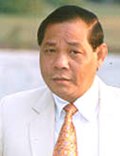 | P. A. Sangma
(1947–2016)
MP for Tura
(States) | 25 September
1985 | 20 January
1986 | 117 days |
|---|
| 17 | |  | Arun Nehru
(1944–2013)
MP for Raebareli
(Internal Security) |
|---|
| (6) | |  | Ram Niwas Mirdha
(1924–2010)
MP for Rajasthan (Rajya Sabha) | 14 March
1986 | 14 June
1986 | 0 days |
|---|
| 18 | |  | Ghulam Nabi Azad
(born 1949)
MP for Washim
(States) | 12 May
1986 | 22 October
1986 | 163 days |
|---|
| 19 | |  | P. Chidambaram
(born 1945)
MP for Sivaganga | 24 June
1986 | 2 December
1989 | 3 years, 161 days |
|---|
| 20 | | | Chintamani Panigrahi
(1922–2000)
MP for Bhubaneswar | 22 October
1986 | 25 June
1988 | 1 year, 247 days |
|---|
| 21 | |  | Santosh Mohan Dev
(1934–2017)
MP for Silchar
(Internal Security) | 25 June
1988 | 2 December
1989 | 1 year, 160 days |
|---|
| 22 | |  | Subodh Kant Sahay
(born 1951)
MP for Ranchi | 23 April
1990 | 5 November
1990 | 196 days | Janata Dal | Vishwanath | | Vishwanath Pratap Singh |
|---|
| 21 November
1990 | 21 June
1991 | 228 days | Samajwadi Janata Party (Rashtriya) | Chandra Shekhar | | Chandra Shekhar |
| 23 | |  | M. M. Jacob
(1926–2018)
MP for Kerala (Rajya Sabha) | 21 June
1991 | 17 January
1993 | 1 year, 210 days | Indian National Congress (I) | Rao | | P. V. Narasimha Rao |
|---|
| 24 | | 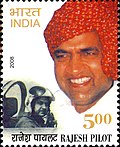 | Rajesh Pilot
(1945–2000)
MP for Dausa
(Internal Security) | 18 January
1993 | 15 September
1995 | 2 years, 240 days |
|---|
| 25 | |  | P. M. Sayeed
(1941–2005)
MP for Lakshadweep | 19 January
1993 | 2 years, 239 days |
|---|
| 26 | |  | Syed Sibtey Razi
(1939–2022)
MP for Uttar Pradesh (Rajya Sabha) | 15 September
1995 | 16 May
1996 | 244 days |
|---|
| 27 | | | Ram Lal Rahi
(1934–2020)
MP for Misrikh |
|---|
| 28 | | | Meijinlung Kamson
(born 1939)
MP for Outer Manipur |
|---|
| 29 | |  | Mohammed Taslimuddin
(1943–2017)
MP for Kishanganj | 1 June
1996 | 9 June
1996 | 8 days | Janata Dal | Deve Gowda | | H. D. Deve Gowda |
|---|
| 30 | | | Maqbool Dar
(1943–2008)
MP for Anantnag | 10 July
1996 | 21 April
1997 | 285 days |
|---|
1 May
1997 | 19 March
1998 | 322 days | Gujral | | Inder Kumar Gujral |
| 31 | |  | Ram Naik
(born 1934)
MP for Mumbai North | 5 May
1999 | 13 October
1999 | 161 days | Bharatiya Janata Party | Vajpayee II | | Atal Bihari Vajpayee |
|---|
| 32 | | 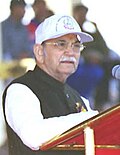 | I. D. Swami
(1929–2019)
MP for Karnal | 13 October
1999 | 22 May
2004 | 4 years, 222 days | Vajpayee III |
|---|
| 33 | |  | C. Vidyasagar Rao
(born 1941)
MP for Karimnagar | 13 October
1999 | 29 January
2003 | 3 years, 108 days |
|---|
| 34 | |  | Harin Pathak
(born 1947)
MP for Ahmedabad East | 29 January
2003 | 22 May
2004 | 1 year, 114 days |
|---|
| 35 | |  | Chinmayanand Swami
(born 1947)
MP for Jaunpur | 24 May
2003 | 22 May
2004 | 364 days |
|---|
| 36 | | 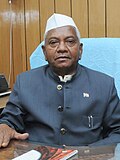 | Manikrao Hodlya Gavit
(1934–2022)
MP for Nandurbar | 23 May
2004 | 6 April
2007 | 2 years, 318 days | Indian National Congress | Manmohan I | | Manmohan Singh |
|---|
| 37 | |  | Shriprakash Jaiswal
(1944–2025)
MP for Kanpur | 23 May
2004 | 22 May
2009 | 4 years, 364 days |
|---|
| 38 | |  | S. Regupathy
(born 1950)
MP for Pudukkottai | 23 May
2004 | 15 May
2007 | 2 years, 357 days | Dravida Munnetra Kazhagam |
|---|
| 38 | |  | V. Radhika Selvi
(born 1976)
MP for Tiruchendur | 18 May
2007 | 22 May
2009 | 2 years, 4 days |
|---|
| 39 | |  | Shakeel Ahmad
(born 1956)
MP for Madhubani | 6 April
2008 | 22 May
2009 | 1 year, 46 days | Indian National Congress |
|---|
| 40 | |  | Mullappally Ramachandran
(born 1944)
MP for Vatakara | 28 May
2009 | 26 May
2014 | 4 years, 363 days | Manmohan II |
|---|
| 41 | | 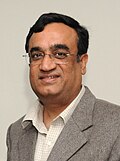 | Ajay Maken
(born 1964)
MP for New Delhi | 28 May
2009 | 19 January
2011 | 1 year, 236 days |
|---|
| 42 | |  | Gurudas Kamat
(1954–2018)
MP for Mumbai North West | 19 January
2011 | 12 July
2011 | 174 days |
|---|
| 43 | |  | Jitendra Singh
(born 1971)
MP for Alwar | 12 July
2011 | 28 October
2012 | 1 year, 108 days |
|---|
| 44 | |  | R. P. N. Singh
(born 1964)
MP for Kushi Nagar | 28 October
2012 | 26 May
2014 | 1 year, 210 days |
|---|
| 45 | |  | Kiren Rijiju
(born 1971)
MP for Arunachal West | 26 May
2014 | 30 May
2019 | 5 years, 4 days | Bharatiya Janata Party | Modi I | | Narendra Modi |
|---|
| 46 | |  | Haribhai Parthibhai Chaudhary
(born 1954)
MP for Banaskantha | 9 November
2014 | 5 July
2016 | 1 year, 239 days |
|---|
| 47 | | 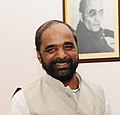 | Hansraj Gangaram Ahir
(born 1954)
MP for Chandrapur | 5 July
2016 | 30 May
2019 | 2 years, 329 days |
|---|
| 48 | |  | G. Kishan Reddy
(born 1964)
MP for Secunderabad | 31 May
2019 | 7 July
2021 | 2 years, 37 days | Modi II |
|---|
| 49 | |  | Nityanand Rai
(born 1966)
MP for Ujiarpur | 31 May
2019 | 9 June
2024 | 5 years, 9 days |
|---|
| 50 | |  | Ajay Mishra Teni
(born 1960)
MP for Kheri | 7 July
2021 | 9 June
2024 | 2 years, 338 days |
|---|
| 51 | |  | Nisith Pramanik
(born 1986)
MP for Cooch Behar |
|---|
| (49) | |  | Nityanand Rai
(born 1966)
MP for Ujiarpur | 10 June
2024 | Incumbent | 1 year, 174 days | Modi III |
|---|
| 52 | | 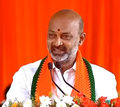 | Bandi Sanjay Kumar
(born 1971)
MP for Karimnagar |
|---|
|





















